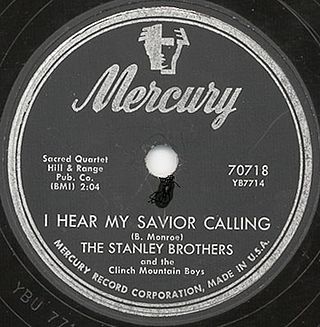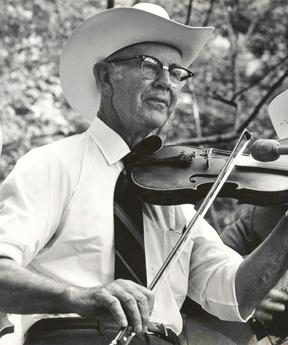
William Smith Monroe was an American mandolinist, singer, and songwriter, and created the bluegrass music genre. Because of this, he is often called the "Father of Bluegrass".

Bluegrass music is a genre of American roots music that developed in the 1940s in the Appalachian region of the United States. The genre derives its name from the band Bill Monroe and the Blue Grass Boys. Like mainstream country music, it largely developed out of old-time string music, though in contrast, it is traditionally played exclusively on acoustic instruments and also has roots in traditional English, Scottish and Irish ballads and dance tunes, as well as in blues and jazz. It was further developed by musicians who played with Monroe, including 5-string banjo player Earl Scruggs and guitarist Lester Flatt. Monroe characterized the genre as "Scottish bagpipes and ole-time fiddlin'. It's a part of Methodist, Holiness and Baptist traditions. It's blues and jazz, and it has a high lonesome sound."

The Stanley Brothers were an American bluegrass duo of singer-songwriters and musicians, made up of brothers Carter Stanley and Ralph Stanley. Ralph and Carter performed as The Stanley Brothers with their band, The Clinch Mountain Boys, from 1946 to 1966. Ralph kept the band name when he continued as a solo artist after Carter's death, from 1967 until his own death in 2016.
Benny Edward Martin, was an American bluegrass fiddler who invented the eight-string fiddle. Throughout his musical career he performed with artists such as the Bluegrass Boys, Don Reno, the Smoky Mountain Boys and Flatt and Scruggs, and later performed and recorded with the Stanley Brothers, Hylo Brown, Jimmy Martin, Johnnie and Jack, and the Stonemans, among others. He was inducted into the International Bluegrass Music Hall of Fame in 2005.

James Henry Martin was an American bluegrass singer and musician, known as the "King of Bluegrass".
"Blue Moon of Kentucky" is a waltz written in 1945 by bluegrass musician Bill Monroe and recorded by his band, the Blue Grass Boys. Some think the origins may trace back to "Roll Along, Kentucky Moon", a similar waltz recorded 20 years prior by Jimmie Rodgers. The song has since been recorded by many artists, including Elvis Presley, Paul McCartney. The song is the official bluegrass song of Kentucky.

Flatt and Scruggs were an American bluegrass duo. Singer and guitarist Lester Flatt and banjo player Earl Scruggs, both of whom had been members of Bill Monroe's band, the Bluegrass Boys, from 1945 to 1948, formed the duo in 1948. Flatt and Scruggs are viewed by music historians as one of the premier bluegrass groups in the history of the genre.

Delano Floyd McCoury is an American bluegrass musician. As leader of the Del McCoury Band, he plays guitar and sings lead vocals along with his two sons, Ronnie McCoury and Rob McCoury, who play mandolin and banjo respectively. In June 2010, he received a National Heritage Fellowship lifetime achievement award from the National Endowment for the Arts and in 2011 he was elected into the International Bluegrass Music Hall of Fame.

Reno and Smiley were an American musical duo that was composed of Don Reno and Red Smiley. They were one of the most acclaimed duos in country and bluegrass music in the 1950s and early 1960s.
Clyde Moody, also known as the "Hillbilly Waltz King" and sometimes as "The Genial Gentleman of Country Music" was one of the great founders of American Bluegrass music.

Doyle Wayne Lawson is an American traditional bluegrass and Southern gospel musician. He is best known as a mandolin player, vocalist, producer, and leader of the 6-man group Doyle Lawson & Quicksilver. Lawson was inducted into the International Bluegrass Music Hall of Fame in 2012.

Kenneth Clayton Baker was an American fiddle player best known for his 25-year tenure with Bill Monroe and his group The Blue Grass Boys.

Charlie Monroe was an American country and bluegrass music guitarist. Charlie performed with his brother, Bill, as part of the Monroe Brothers. He later formed his own group, Charlie Monroe & the Kentucky Pardners.
Robert Russell "Chubby" Wise was an American bluegrass fiddler.
Bluegrass fiddling is a distinctive style of American fiddle playing which is characterized by bold, bluesy improvisation, off-beat "chopping", and sophisticated use of both double-stops and old-time bowing patterns.
Bessie Lee Mauldin was an American bluegrass bassist, singer, songwriter, and a member of the bluegrass band “Bill Monroe and the Blue Grass Boys” from 1953–1964. Bessie Lee was nicked named "The Carolina Songbird" by Bill Monroe.

Birch Monroe was an American old time and early bluegrass fiddler, bassist, dancer, founding member of the Monroe brothers, and older brother to Charlie and Bill Monroe. He grew up on a farm with five brothers and sisters before leaving it in the late twenties. Unlike brothers Charlie and Bill he chose to not pursue a career in music.
Cleo Davis was an American musician from Georgia who gained prominence as "the original Blue Grass Boy". The creator of the "Blue Grass Boys" was Bill Monroe, also known as The Father of Bluegrass. Davis' performing career spanned 48 years as a singer and instrumentalist, and greatly influenced the bluegrass music and bluegrass artists of today.
Herschel Lee Sizemore was an American mandolinist in the bluegrass tradition.
Milton Esco Estes was an American country music and Southern gospel singer and musician. Estes was a host and house performer at the Grand Ole Opry.









